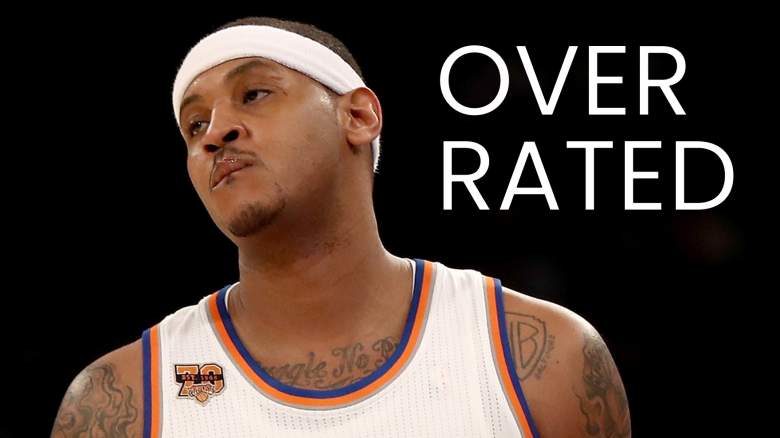
The NBA is a league driven by big-time stars. Players capture fans’ attention in a variety of ways, some legends cementing themselves as near-mythical figures.
Players can be elevated in status thanks to hype, media narratives, or expected potential.
But not every player has been able to live up to the heights observers anticipated. Some players’ careers have fallen short of the narrative built up around them.
We’ll separate myth from reality and examine some of the biggest figures in basketball history — the 10 most overrated NBA players ever:
10. Jason Williams (1998-2011)
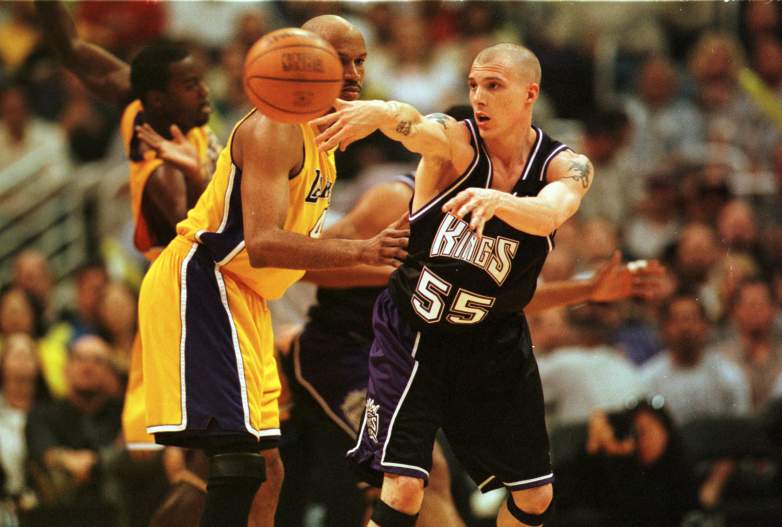
GettyJason Williams passes around guard Ron Harper.
Known by NBA fans affectionately as “White Chocolate,” Jason Williams and his signature streetball-inspired style of play dazzled fans throughout his 13-year career. With his flashy passes, slick handles, and overall creativity with the rock in his hand, Williams quickly became one of the more exciting and beloved players in the league.
While his style of play was a marvel to watch, the truth is that Williams played with a lot more flair than substance. Williams often struggled with inefficiency, turnovers, and overall consistency. There’s a reason the Kings improved from just a fun team to a contender when swapping Williams for Mike Bibby in the early 2000s.
Despite his exceptional highlight reel, Williams was never one of the best players on any team he was a part of. Even when he won a title with the Miami Heat in 2006, Williams was considered more of a complementary role player than anything.
Williams’ impact on the game is undeniable, inspiring many young players to adopt streetball-like elements in their game; yet this may be a case where the on-court production does not compare to the legend built around him.
9. Tracy McGrady (1997-2012)
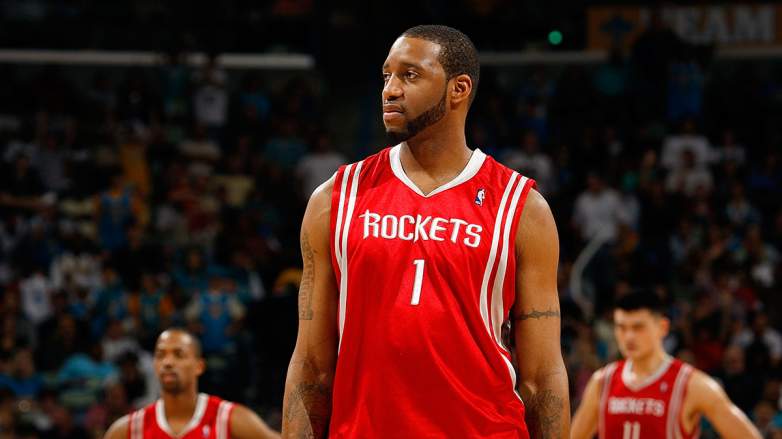
GettyNBA Hall of Famer Tracy McGrady.
Tracy McGrady‘s talent is undeniable. T-Mac’s combination of size, athleticism, and basketball fundamentals made him one of the most exciting players of the 2000s. Who can forget the time he scored 13 points in 35 seconds?
While his skills were never in question, his talents were never really able to translate to team success. McGrady played on various teams throughout his career, yet was never able to elevate any of these teams to the next level. McGrady has the unfortunate distinction of never winning a playoff series up until his final year, where he was an end-of-the-bench player for the San Antonio Spurs.
Constant injuries indeed played a huge role in his lack of postseason success. But still, T-Mac’s ability (or lack thereof) to elevate his team when it mattered most leaves many questioning his legacy.
8. Bill Walton (1974-78, 1979-80, 1982-1987)

GettyBill Walton attends the 2018 NBA All-Star Game.
Bill Walton‘s peak was absolutely spectacular. The cornerstone of the Portland Trail Blazers‘ 1977 championship run, Walton could do it all as a center, and was rightfully seen as one of the most skilled big men of his time.
But the best phrase to describe Walton’s career may be “unfulfilled potential.” When he did play, he was one of the best players to take the floor; unfortunately, persistent injuries often limited Walton’s time on the court. During his professional career, Walton actually missed more games (680) than he played (488) due to a laundry list of injuries, from stress fractures in his feet to chronic back pain.
Walton’s legacy is propped up heavily by his previously mentioned 1977 championship run along with his time as a top tier role player for the Boston Celtics, where he won another championship in 1986. And while he was certainly one of the best players in the world for a short time, it’s hard to rank someone with such a small body of work among all-time greats as he often is.
7. Vince Carter (1998-2020)
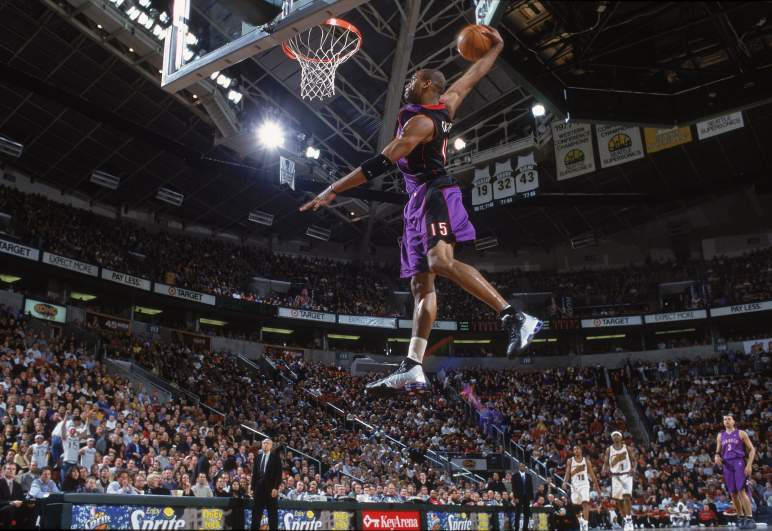
GettyVince Carter going up for a huge dunk.
Like his cousin T-Mac, Vince Carter was one of the most exciting players of his generation. Known for his highlight reel of dunks and generational athleticism, Carter is widely considered the greatest dunker of all time.
Despite his reputation as one of the defining players of his generation, Carter’s accolades and team success leave a bit to be desired. Carter earned only two All-NBA nods in his 22-year-long career, and his playoff resume isn’t what you’d expect from a player of Carter’s status. Carter just never seemed to have the leadership or consistency as a top flight player to lead any of his teams anywhere truly meaningful. This isn’t to say Carter was ever a net-negative on the court; he just never panned out as the franchise cornerstone he appeared to be as a young player.
Vinsanity’s contributions to the game of basketball are undeniable. His performance at the 2000 Dunk Contest along with his influence on basketball in Canada cannot be understated. Furthermore, he provided a great veteran presence in his later years for teams like the Dallas Mavericks and Orlando Magic. Even so, Vince’s individual accolades and team success do not reflect his incredible talents and what he could’ve been.
6. Rudy Gobert (2013-Present)
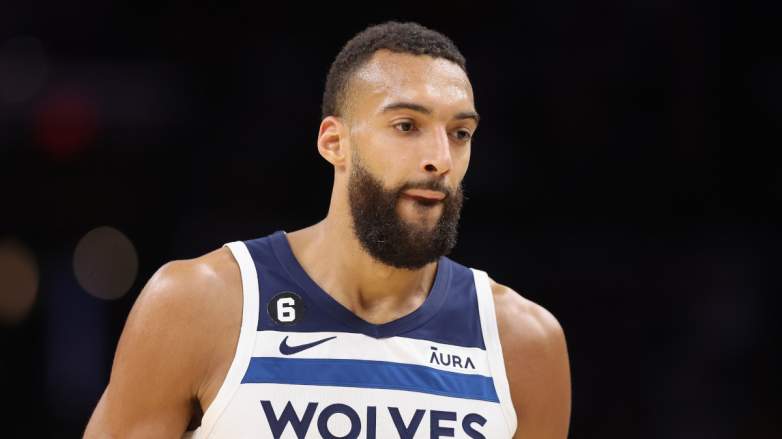
GettyRudy Gobert on the court during a bout with the Phoenix Suns.
The most recent player on this list, Rudy Gobert of the Minnesota Timberwolves has fully solidified himself as one of the premier defensive talents of the modern era. A record-tying four-time Defensive Player of the Year, Gobert has consistently been a problem in the paint. Gobert’s rim protecting skills and ability to alter shots are almost second to none, with his teams frequently ranking near the top of the league in terms of defense.
But Gobert is prone to having his flaws exposed, especially come playoff time. Opposing teams frequently exploit his lack of lateral quickness and pull him out of the paint, where he has shown struggles against smaller players. Given how much today’s game emphasizes versatility and ability to switch at a moment’s notice, Gobert’s lack thereof really sticks out.
Gobert’s offensive limitations have often been a point of criticism as well, with the 7-foot-1 Frenchman not offering much on that side of the ball aside from limited finishing ability.
With these flaws, Gobert has been borderline unplayable in certain playoff series. While he’s very good at what he specializes in, when forced to change his style Gobert has not shown the greatest adaptability. It’s because of this that many Gobert-anchored rosters have not been able to make serious runs in the playoffs.
Gobert will go down as one of the better rim defenders in history, but with how defense is played in the modern era, one can argue that this alone shouldn’t be enough for a record-tying four DPOYs. Gobert will certainly be a player with a polarizing legacy and a huge talking point when it comes to ranking all-time defenders.
5. Robert Horry (1992-2008)

GettyRobert Horry looks up at the ball against the Houston Rockets.
Here is an example of someone whose playoff success has boosted his perception among fans. Robert Horry, or “Big Shot Bob,” is renowned for being one of the most successful role players in NBA history, with a penchant for knocking down huge shots in the playoffs for teams like the Los Angeles Lakers and the San Antonio Spurs, earning seven rings along the way.
However, even with these moments, Horry still only had averages of 7.9 points and 5.6 rebounds per game through 244 postseason games. In addition, Horry never had a reputation as an efficient or even effective scorer, shooting below 40% in six different seasons. Looking at these stats, it’s clear that Horry has been one of the biggest beneficiaries of playing alongside some all-time greats.
While Horry has provided some incredible moments in the postseason, it’s hard to simply gloss over the fact that he was simply average for most of his career.
4. Derrick Rose (2008-2024)
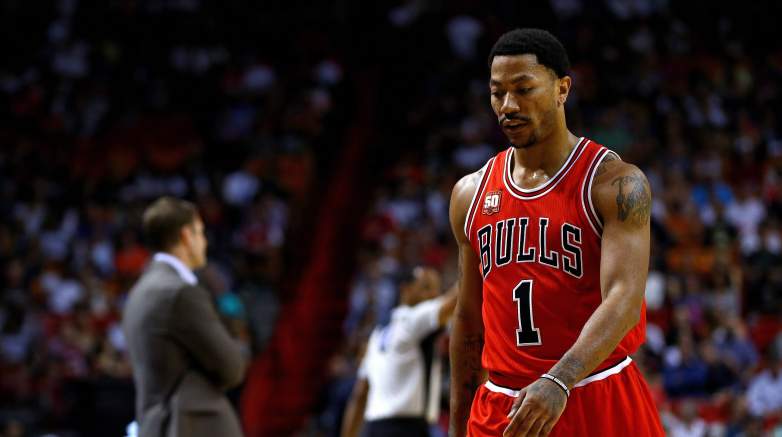
GettyDerrick Rose of the Chicago Bulls looks on during a game against the Miami Heat.
One of the more heartbreaking tales of the NBA, Derrick Rose looked primed to become one of the faces of the league following his unforgettable 2010-11 campaign. At just 22 years old, Rose led the Chicago Bulls to the best record in the league and became the youngest player to ever win the MVP award. Rose’s combination of speed, leaping ability, and playmaking ability turned him into a sensation, with the future looking bright.
In the 2012 playoffs, Rose suffered the first of many debilitating knee injuries that would plague him the rest of his career. In the years following, Rose’s injuries would only continue to pile up, robbing him of the athleticism that inspired his MVP campaign in the first place. It’s a shame that in what should’ve been his most athletic years, Rose was often in rehabilitation for injuries.
Later in his career, Rose was fortunately able to bounce back from these injuries and perform as a high-level role player, but he was never able to reach the level he did at such a young age. And while his 2011 season showed what could’ve been for D-Rose, the fact of the matter is that his overall career fell short of the expectations many had when Rose was a young player.
With Rose’s recent retirement, the question of his Hall of Fame candidacy will be a hot topic of discussion. While every other MVP in league history has made it, there’s a good chance that despite the explosive start to his career, Rose’s resume isn’t enough to be enshrined.
READ NEXT: The 10 Biggest MVP Snubs in NBA History
3. Carmelo Anthony (2003-2022)
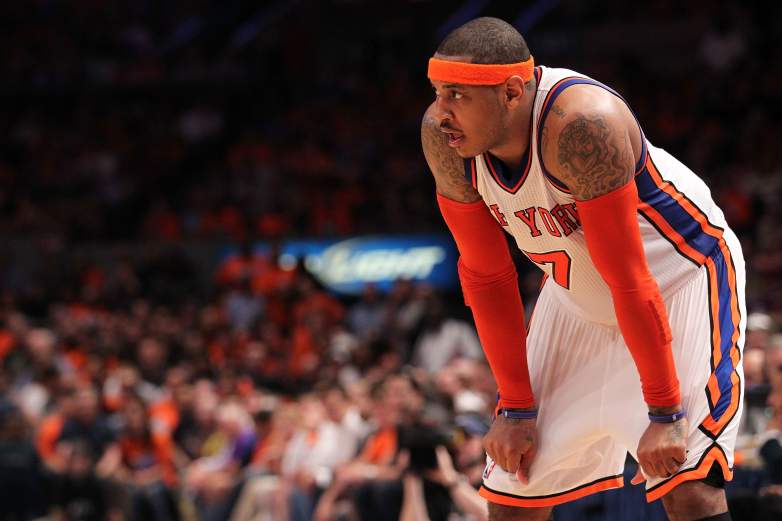
GettyCarmelo Anthony looks on against the Boston Celtics.
Carmelo Anthony is undoubtedly one of the greatest individual scorers in NBA history. As one of the top picks from the famed 2003 draft, Melo immediately flashed generational talent on the offensive side of the ball. Over the course of his career, he was often one of the best three-level scorers in the game, serving as a matchup nightmare for many and becoming one of the premier players of his generation.
Anthony’s incredible scoring ability is undeniable, but it can be argued that his legacy is a bit overstated. Despite being ranked as one of the Top 75 players in NBA history, Anthony became the poster child of stats with no team success. Melo never made it past the conference finals despite playing on some impressive rosters.
A large part of this was his playstyle; sure, he’s one of the best scorers ever, but his playstyle was isolation-heavy and didn’t translate well to winning basketball. With the league adapting to a more team-oriented style of play during his career, his brand of offense mixed with his defensive liabilities left Anthony in the dust in a sense. As a veteran, he never really seemed to be able to serve a complementary role well, often wanting to serve as the primary offensive option.
While Anthony was a standout on the offensive side of the ball, it may be his otherworldly scoring ability that held him back from greater success. Melo remains a well-respected player but his lack of overall success raises some questions when talking about all-time greats.
2. Allen Iverson (1996-2010)
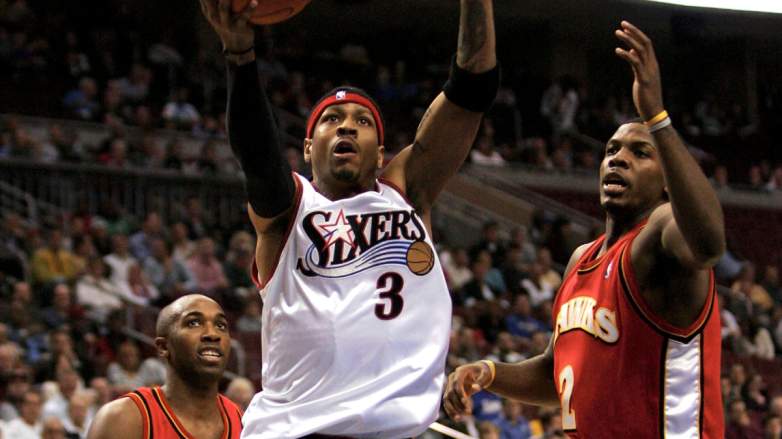
GettyJoe Johnson looks on as Allen Iverson goes to the basket.
Allen Iverson is an absolute icon of the game. With his larger-than-life personality and rebellious spirit, Iverson perfectly embodied the 2000s basketball culture. His unique style, marked by tattoos, cornrows, and uber-baggy clothes broke the mold of how professional athletes carried themselves. AI’s authenticity made him a relatable figure for fans everywhere, with moments like his “practice” rant showcasing his unapologetic personality and ability to stay true to himself.
The 6-foot Iverson more than held his own in a land of giants, thanks to his excellent handles and scoring ability. Iverson’s best season as a player came in 2001, when he won the MVP award, thus becoming the shortest player to ever win the crown. He followed this up by leading the Philadelphia 76ers to a Finals appearance against the Lakers, where they ultimately lost in five. Despite falling just short of the big prize, AI’s heart and determination throughout this campaign inspired many, making him a revered figure in basketball.
However, like many others on this list, his influence can often mask the flaws in Iverson’s game. Iverson’s most common criticism is his highly inefficient brand of scoring, and this is not unfounded. In his 12 seasons as a member of the Sixers, Iverson never shot above 46.1% from the field, earning him a reputation as something of a shot-chucker. Sure, this was the era where this was a common brand of basketball, but comparing this to other all-time players, it serves as a huge knock against AI’s legacy.
Another criticism of Iverson is his inability to adapt his game for the betterment of his team. The same individualistic personality that made him a legend also hindered his ability to thrive in more team-based systems. Iverson struggled mightily in systems that required him to be less dominant, making it hard to pair him with other top-flight talent. Iverson often needed control of the ball and would clash with coaches’ attempts to implement different styles of offense.
For all of his individual success, Iverson’s teams were never able to take that next step aside from his 2001 Finals appearance. Iverson will certainly go down as one of the more influential players ever from a cultural standpoint, but perhaps the on-court product wasn’t as good as remembered.
1. Kobe Bryant (1996-2016)
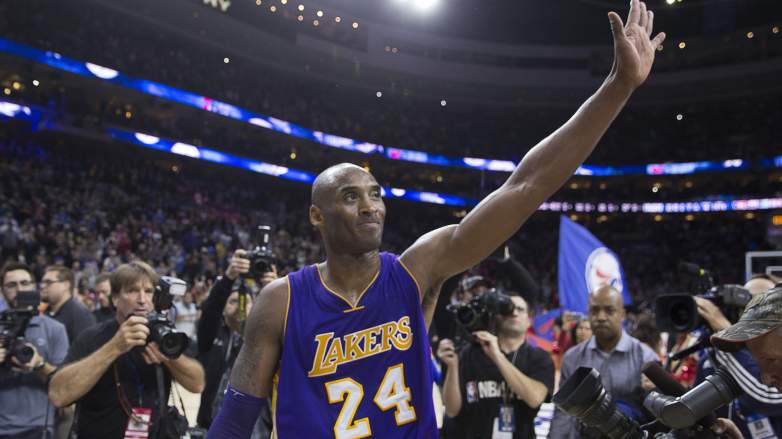
GettyKobe Bryant waves to the crowd after his final game in his hometown of Philadelphia, Pennsylvania, on December 1, 2015.
Kobe Bryant is one of the greatest and most decorated players in NBA history. Best known for his insane work ethic, fiery competitiveness, and signature “Mamba Mentality,” the Lakers legend is considered not only one of the most influential players of his generation but of all time. His offensive ability was unmatched, from his fantastic footwork to his ability to come through in clutch moments. And with five championships, two finals MVPs, and a laundry list of other accolades on top of this, it’s easy to see why his career is looked back upon so fondly.
While his impact on the game, especially his famed “Mamba Mentality” and cyborg-like work ethic, cannot be understated, Kobe’s constant ranking among the greatest ever is arguable. Fans, pundits, and players alike consistently have him in the Top 5 talks, and while you can make a case for it, critical examination shows that he just doesn’t stack up to talents like Michael Jordan or LeBron James.
Bryant’s tendency to dominate the ball and take difficult shots was a hallmark of his game, yet it was this same tendency that worked against his teams in crucial moments. His high-volume shooting and questionable shot selection looked otherworldly and clutch when it worked out, but the pitfalls of this style of play are often ignored. With three of Kobe’s five championships coming as a second option to Shaquille O’Neal, one could argue that he excelled most when he wasn’t the primary option. While Bryant was a major factor in the Lakers’ dynasty, the success of these early championship years was largely built with Shaq as the centerpiece.
Another facet of Bryant’s game that is lauded is his defensive ability; Bryant earned 12 All-Defensive Team selections throughout his career, but it can be argued that many of these were awarded more based on reputation than actual ability. Kobe was more of an inconsistent defender than you’d expect, oftentimes gambling for steals or letting his matchup blow by him to conserve energy for offense.
Bryant is one of the greatest legends the league has ever seen, with a storybook career that has inspired an entire generation of players. His unparalleled work ethic and penchant for performing in big-time moments make him one of the most revered athletes ever. With that being said, his game was not without its flaws, keeping him just out of the top tier of players that he is often grouped with. He belongs firmly in the 10-15 range of all-time greats but fails to reach the status of flawless Top 5 player that fervent fans insist he is.
Comments
10 Most Overrated NBA Players of All Time